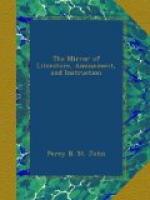The author of the Guardian, in No. 67, gives an account of Tom Durfey, with a view to recommend him to the public notice for a benefit play, and says, that he remembered King Charles the Second leaning on Tom Durfey’s shoulder more than once, and humming over a song with him.
Roi des Violons, or King of the Fiddlers, was anciently a title in France. It became defunct, in 1685, owing to anarchy—thus harmony and discord cannot agree.
P.T.W.
* * * * *
ROSEDALE ABBEY.
(For the Mirror.)
“A churchyard!—’tis
a homely word, yet full
Of feeling; and a sound that o’er
the heart
Might shed religion.”
R. MONTGOMERY.
Ruins! so dark and lone,
The pride of other years,
On which the stars have shone,
To light the mourners’
tears;
The ivy clings
to ye,
And softly hums
the bee
Where violets blue are blooming,
The liquid dews perfuming,
Beneath each withered
tree.
Tombs! o’er your nameless stone
What gentle hearts have wept,
And there, at midnight lone,
Their silent vigils kept;
There Beauty laid
her wreath,
And Love seem’d
“strong as death,”
Around the pale shrines sighing,
While plaintive winds were dying
With music in
their breath.
But childhood loves to stray
Whene’er the sward is
green,
Round your mementos grey,
And haunts the mouldering
scene;
And lovely in
repose,
At sunset’s
gorgeous close,
Your holy walls seem blending
With purple light descending
Upon the beauteous
rose.
Tombs of the past unknown!
Ye are fringed with violets
blue,
And clouds have laved your stone
With sweetest tears of dew;
But when, by angels
given,
The last dread
peal of heaven
Shall rend ye all asunder
With its immortal thunder,
Your dead shall
claim their heaven.
Deal.
G.R.C.
* * * * *
PORTRAIT OF STERNE.
(To the Editor.)
As many of the pages of your extensively-circulated little work have preserved memorials of Laurence Sterne, I hope you can spare room for the underwritten extract, from a letter of his to Mr. Garrick, dated Paris, March, 1762, and which may be seen in Vol I. of Mrs. Medalle’s “Letters of the late L. Sterne.”
My object in thus troubling you is, in the hope (perhaps you will say an almost forlorn, or distant one) that possibly some one of your readers, either here or abroad, maybe able to suggest where it is likely the under-mentioned whole-length portrait may now be of that once very distinguished man.




